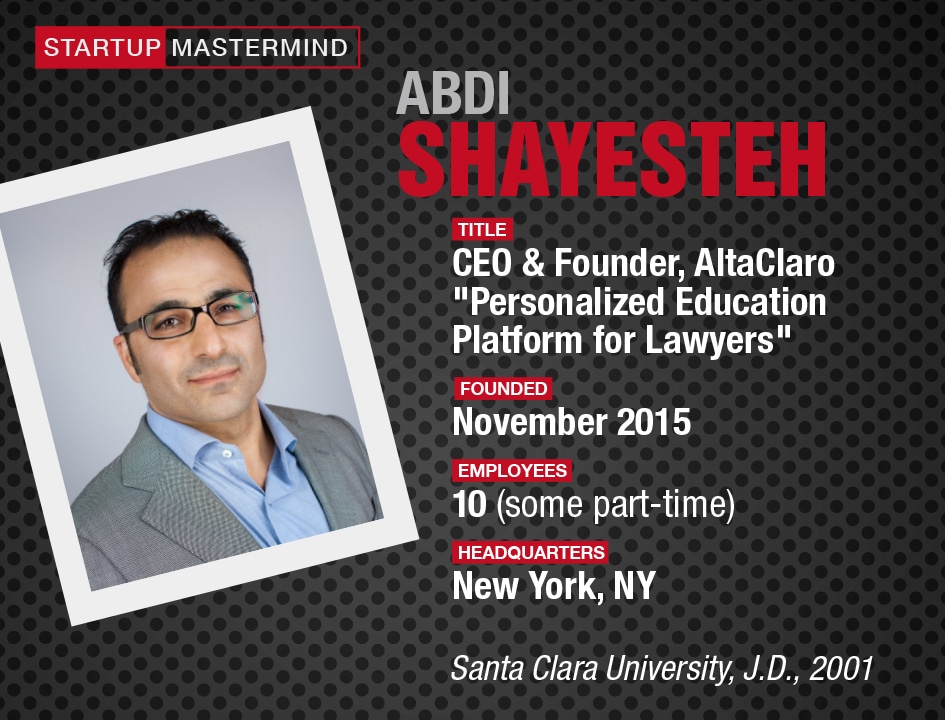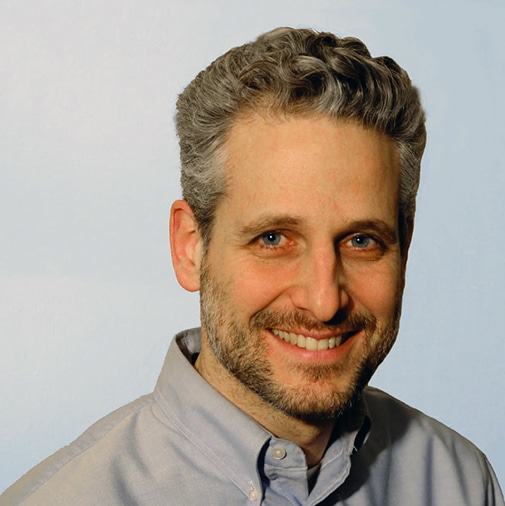From serial entrepreneur to working lawyer and back again, Abdi Shayesteh (sha-YES–tay) has never lost the urge to start and run businesses. After 14 years in corporate, bank regulatory and financial transactions law, Shayesteh chose to act on a pain point many lawyers experience: the need to talk to specialists when you need their expertise. He set up AltaClaro Inc. to make that expertise easier to come by.

PRODUCTIVITY HABITS
When do you wake up? Either 4 a.m. or 6 a.m. It depends on what ideas come to me in the middle of the night. I might wake up at 4 a.m. with an idea and start whiteboarding. I used to fight it. Now I just accept it. I have a whiteboard in my living room and I just get up and start working.
What’s the first thing you do? The first three hours after I wake up are dedicated to me. That includes vegetable juice, then a bike, swim or workout. Then I read, write, meditate and eat a good breakfast. Unless a 4 a.m. whiteboarding session starts my day.
Where do you like to work? We used to use a co-working space, but the environment wasn’t good for me. Now we have a private office in Manhattan.
How do you handle email? I tackle it three times a day — early afternoon, late afternoon, then in the evening — as opposed to responding right away.
What’s your best productivity habit? The billable hour habit is something I carried over from my lawyer days and enjoy, believe it or not. You might sit at your desk for 10 hours, but how many of those hours are meaningful? If I’m at my desk for 10 hours, I try to have at least eight hours “billable,” where I’m doing something meaningful for the company.
Favorite productivity tool? I’m a fan of Slack right now. It lets me turn off everything else — email, phone — and focus on the community I’m working with.
What’s the one habit you wish you could kick? One habit carried over from my law firm days that I’d like to kick is working until I drop. I keep going from Monday through Saturday, 10- to 12-hour workdays. Sunday is my day off, and it’s usually the day I drop. I don’t want to kill the goose that lays the golden eggs. I want Saturday to myself, too. It’s tough to do that when you’re an entrepreneur.
What do you let slide? I prefer teammates who have lots of passion and heart. Many companies focus on super-talented, smart people, but they might be jerks. I’d rather let some mistakes slide if the person has heart and passion.
Best advice you’ve ever received? That came from serial tech entrepreneur Ali Riaz, an advisor and investor who is now chairman of the board of AltaClaro. Ali taught me to lead with empathy and care, and not with ego or fear. Growing up professionally in the legal world, you are often in an environment where people lead by fear. You learn something because a partner throws something at you. That type of learning isn’t sustainable in terms of happiness and loyalty.
THE SPARK BEHIND ALTACLARO
Tell us about your decision to leave law practice and start a technology company. My last legal position was deputy general counsel at MUFG, Mitsubishi UFJ Financial Group. I left at the beginning of 2014. While I enjoyed being a lawyer, when I turned 40, I realized I had this fire inside me, that had been burning for a long time, to be an entrepreneur full time.
Any prior entrepreneurial experience? When I was 17, I launched a clothing company. It financed my college education. I needed it — my parents lost my college savings in a bank scandal. By my senior year, I had 10 people working for me. I sold the company to go to law school. I wrote the story for my law school application and got a scholarship at Santa Clara.
My second experience was shortly after law school, as part of the startup team of a fintech company in Silicon Valley. Initially, I was general counsel. As the company grew, I became head of business development and eventually was appointed CEO.
What business problem are you solving? Our mission is to leverage technology to bring back the time-honored tradition in the legal industry of learning by interaction, collaboration and doing. That’s where deep learning takes place.
Why does it matter to you? Like in other guilds — and the legal profession is a guild — that’s how lawyers are supposed to learn and develop. That’s how they learn in other countries. U.S. firms don’t lend themselves to creating or nurturing these types of learning environments; it’s sink or swim. Since the financial crisis, many lawyers feel they’ve been hung out to dry. I experienced this myself during my 14-year legal career. After spending $100,000 on your legal education, your success as a lawyer shouldn’t depend on luck alone, or the hopes of finding a mentor. All lawyers should be able to have control over their career direction.
What segment of the legal industry are you marketing to? I’ve learned this problem exists everywhere and in different forms in the industry.
When I was a young lawyer, I showed up at the firm thinking I had arrived, and people would teach me what I needed to know through either internal training or mentoring. Reality hit me right away. Everybody had good intentions, including the mentor assigned to me. Everybody was very busy and overwhelmed — far too busy to sit down with me to go through the technical skills at a deep level. I often found myself at 11 p.m., when the partner had gone home, and a senior associate down the hall I had already bothered 10 times that day, with a list of questions.
Later in my career, a lot of new issues came across my desk that I needed to learn about quickly. I didn’t want to be one of those in-house lawyers who simply outsourced to a law firm. I wanted to learn the subject myself. I would read things online, watch videos, go to seminars. But the better way to learn is in conversation with an expert. So I would go through my Rolodex of lawyers at different firms. They were willing to give me a freebie conversation or even a free training session in the hopes of being retained for legal services. Over time, though, that isn’t sustainable. These freebies became uncomfortable. Even if I learned the information, the rest of my team needed it, too. It wasn’t fair to string along these law firms, but it also wasn’t fair to pay $800 to $1,200 an hour to learn something.
That’s why we match lawyers with experts. We want to be a community where lawyers go to gain and share expertise through an experiential learning process. It’s not only a great way to learn but a great way to network.
What do you hope your technology will grow to in the future? Our goal is to become the largest knowledge-based networking platform.
Better than LinkedIn? LinkedIn is a good platform for connecting and networking, but are people sharing knowledge proactively? Is it designed for that? It has Lynda.com, and that’s good, but our platform is more about bringing people together for one-on-one or small-group learning opportunities.
BEST TIP FOR STARTING A LEGAL TECH COMPANY?
Study Jeffrey Moore’s technology adoption cycle (PDF). In the life cycle of technology adoption, there are innovators, early adopters, early majority users, late adopters and laggards. Sell to the early adopters. Early adopters:
- Are potential customers who are excited about technology but they aren’t technologists themselves.
- Can understand the concepts and benefits of new technology.
- Look to other industries to see what’s happening with technology.
- Ponder how their industry can benefit from the adoption of similar technology.
- Are willing to take a risk on new technology.
Don’t waste your time on laggards or late adopters.
This is difficult in the legal industry. But there are early adopters out there, and their numbers are rising.
To succeed, you must build a strong and diverse advisory and management team. The lawyer is one specialist. You also need to bring in opportunists, builders to build the company, and innovators who like to tinker with the product.
Illustration ©iStockPhoto.com; photo courtesy of Abdi Shayesteh.
Subscribe to Attorney at Work
Get really good ideas every day: Subscribe to the Daily Dispatch and Weekly Wrap (it’s free). Follow us on Twitter @attnyatwork.
















